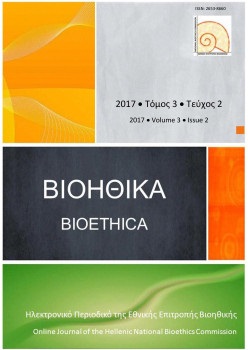New challenges for the law on medically assisted reproduction: The new civil partnership and the planned regulation for sex identification
Abstract
This paper focuses on the new civil partnership starting with the decision of 11.7.2013 ECHR condemning Greece because of the exclusion of same-sex couples from civil partnership. On the occasion of this condemnation a total abolition of civil partnership would be a temporary and regressive solution.
By n. 4356 / 2015 the institution of civil partnership was reformed and the couple is considered as married regarding their interpersonal relations and in the remaining relationships the focus is on private autonomy. The legislative assimilation of the comrades who have signed a civil partnership with a married couple cannot work in the field of affinity with children. The regulatory model of different sex parents and the law of medically assisted reproduction are still dominant. This act of the legislature does not constitute a legal limbo but a conscious choice, which according to the writer does not infringe the principle of equality and Article 4 of the ECHR.
Finally, it is important to say that a current study made by the lawmaking Committee of the Ministry of Justice for sex identification could modify a lot of things in the field of family law.
Article Details
- How to Cite
-
Φουντεδάκη (Katerina Fountedaki) Κ. (2017). New challenges for the law on medically assisted reproduction: The new civil partnership and the planned regulation for sex identification. Bioethica, 3(2), 9–16. https://doi.org/10.12681/bioeth.19720
- Section
- Original Articles
Authors who publish with this journal agree to the following terms:
- Authors retain copyright and grant the journal right of first publication with the work simultaneously licensed under a Creative Commons Attribution CC BY 4.0 License, which allows for immediate free access to the work and permits any user to read, download, copy, distribute, print, search, or link to the full texts of articles, crawl them for indexing, pass them as data to software, or use them for any other lawful purpose. Appropriate credit must be given by citing the author(s) and the original publication in this journal.
- Authors are able to enter into separate, additional contractual arrangements for the non-exclusive distribution of the journal's published version of the work (e.g. post it to an institutional repository or publish it in a book), with an acknowledgement of its initial publication in this journal.
We encourage authors to deposit their articles, as well as data underlying the publications, in institutional and/or other appropriate subject repositories.
Bioethica permits and encourages authors to archive the final publication pdf in institutional (e.g. the repository of the National Hellenic Research Foundation) or other appropriate subject repositories (e.g. SSOAR repository for social sciences), in compliance with institutional and/or funder open access policies, after publication in the BIOETHICA. Authors must provide bibliographic details that credit publication in the journal, as well as related funding details (when applicable).
Lists of institutional and other subject-based academic open access repositories can be found listed by country at the registry http://opendoar.org/countrylist.php
If your institution does not possess a repository you may deposit a copy of your paper at no cost with www.zenodo.org , the repository supported for open access research in the EU by the European Commission, through the project OpenAIRE (www.openaire.eu )



